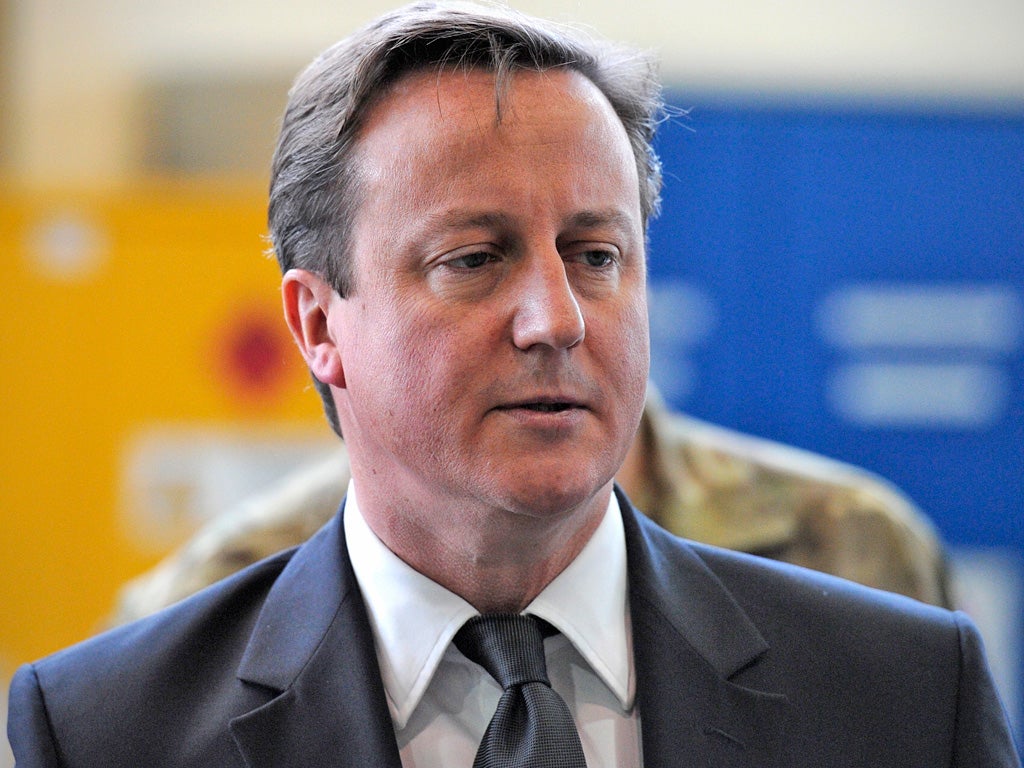David Cameron tries to buy off Eurosceptics with threat to employment rights
Provocative warning exposes divisions in the Coalition

Your support helps us to tell the story
From reproductive rights to climate change to Big Tech, The Independent is on the ground when the story is developing. Whether it's investigating the financials of Elon Musk's pro-Trump PAC or producing our latest documentary, 'The A Word', which shines a light on the American women fighting for reproductive rights, we know how important it is to parse out the facts from the messaging.
At such a critical moment in US history, we need reporters on the ground. Your donation allows us to keep sending journalists to speak to both sides of the story.
The Independent is trusted by Americans across the entire political spectrum. And unlike many other quality news outlets, we choose not to lock Americans out of our reporting and analysis with paywalls. We believe quality journalism should be available to everyone, paid for by those who can afford it.
Your support makes all the difference.The Conservative leadership yesterday warned it might demand Britain's exemption from European employment protection laws as a condition for any treaty change needed to help save the euro.
In a provocative move, seen as a sop to rebellious Conservative backbenchers, the Education Secretary, Michael Gove, said he would like to see regulations governing "whom we can hire, how we can hire and how long they work" taken away from Brussels.
He added: "I would like to see a change in this Parliament... We need to win [back] more [powers] and that process will require careful negotiation."
Mr Gove's comments were backed by political aides in Downing Street who suggested Mr Cameron would like to see a British opt-out from parts of the EU Working Times Directive as the British price in any treaty negotiations.
But in a sign of deep tensions within the Coalition over Europe, the Prime Minister's official spokesman said later that neither Mr Cameron nor Mr Gove were speaking for the Government on the issue.
He added that the Coalition Agreement included a commitment only to look at "the balance of competences" between Britain and the EU, but any specific negotiating tactic would have to be agreed between the parties.
In comments later, the Deputy Prime Minister made it clear that the Liberal Democrats would not support any large-scale attempt to repatriate powers in return for a treaty change.
"[We are] going to lead debate in Europe towards greater competitiveness, more jobs, more growth and more prosperity in the future. And the way you do that is by asking yourself every step of the way what can we get out of Europe, not how can we get out of Europe," he said. Privately, Lib Dem sources said the Conservative leadership were "desperately flailing around" trying to soothe their backbenches after Monday's revolt.
They added that while the party would not oppose negotiating small changes to the specifics of employment law they would not support any wholesale opt-out of the Working Time Directive.
"We are not going to go to the wall for every comma, but we are very clear that we regard making the single market work better for Britain as our priority in any possible treaty negotiation," said one.
Labour attempted to capitalise on the Coalition divisions. The shadow Foreign Secretary, Douglas Alexander, wrote to William Hague warning that "disunity... between and within the coalition parties is already undermining Britain's credibility in ongoing European discussions".
Mr Alexander later said: "Last night demonstrated that we have got a deeply divided Conservative Party. But the comments that have emerged this morning from the Deputy Prime Minister, Nick Clegg, seem to confirm that we have a deeply divided Government.
"Within a couple of hours of Michael Gove taking to the airwaves this morning promising the repatriation of powers, we have now got the Deputy Prime Minister, his cabinet colleague, flatly contradicting him and saying there will be no repatriation of powers as part of the Coalition Government's programme.
"The public deserves better than a Government turning inwards and fighting with each other instead of fighting for British jobs, British investment and British growth. This spectacle of an out-of-touch and divided Government is undermining the influence Britain has at the European negotiating table."
At issue: The working time directive
The Working Time Directive guarantees workers in the European Union a minimum number of holidays each year, paid breaks and rest of at least 11 hours in any 24 hours, and makes a default right to work no more than 48 hours per week.
The Tories – who refused to sign up to the directive in Government – have always been hostile to it, arguing that it is anti-competitive and has had a damaging effect on the National Health Service, where junior doctors traditionally worked long hours "on call".
David Cameron is on record as saying he wants "to negotiate the return of Britain's opt-out from social and employment legislation in those areas which have proved most damaging to our economy and public services, for example the aspects of the Working Time Directive, which are causing real problems in the NHS and the Fire Service".
Join our commenting forum
Join thought-provoking conversations, follow other Independent readers and see their replies
Comments